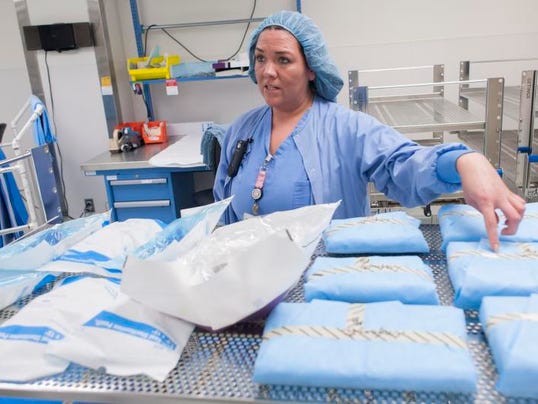
Now Scheduling Primary Care Appointments Online. Book Now.
Hospitals focusing on solutions
Oaklawn Hospital in Marshall and Borgess Medical Center in Kalamazoo were among 24 Michigan hospitals considered to be in the bottom fourth of all hospitals for rates of hospital-acquired conditions. According to data posted by the Centers for Medicare and Medicaid Services Dec. 10, the reporting period covers cases from 2012 to 2014.
The penalty, levied by the government as a part of the Affordable Care Act, will come in the form of a 1 percent reduction in Medicare reimbursement in the 2016 fiscal year, according to the Economic Alliance for Michigan.
Hospital-acquired conditions include problems such as central line associated bloodstream infections, catheter-associated urinary tract infections, surgical site infections and others. Hospitals were ranked based on those cases and data from other agencies, such as the Centers for Disease Control and Prevention.
If a hospital had a score greater than 6.75, it was considered to be in the penalized group. Oaklawn scored 7.25; Borgess had a 7.5 score.
In a news release, Oaklawn Hospital officials said there were four reportable surgical site infections, one catheter-associated urinary tract infection and one central-line bloodstream infection.
Oaklawn Executive Director of Organizational Excellence Jane Jones said that earlier this year, the hospital brought consulting firm Soyring Consulting to help identify hospital-acquired condition issues and correct them in a seven-month process.
“We did do an internal analysis, a root-cause analysis, to see if we could find any patterns or trends, and we couldn’t,” Jones said as to why a consultant was brought in. “It just seemed random.”
Two of the categories — colon and abdominal surgery site infections and catheter-associated urinary tract and central line bloodstream infections — have low patient volumes at Oaklawn, Jones said. That meant it didn’t take many cases to give a high score, and Jones said the Centers for Medicare and Medicaid Services doesn’t adjust for that.
“And that’s not an excuse, but it makes it very difficult,” Jones said.
Oaklawn looked at several factors, Jones said, in trying to determine areas for improvement. Some of them were simple, such as remembering to change surgical masks more often, or making sure to cover arms and hair. Others were more technical, including looking at the placement of air conditioning units that could blow out dust and bacteria, or using a longer instrument sterilization process more often.
Other solutions directly involve patients, Jones said. Those included making a better determination on whether or not a patient is ready to go into surgery, or helping patients better manage conditions that can lead to later problems, such as diabetes.
“All of us in health care, all hospitals, I know they try to do the best that they can,” Jones said. “There’s just some things that happen that we can’t control.”
In a statement to the Enquirer, Borgess Medical Center’s Medical Director for Infection Prevention and Control Services Dr. David Davenport said quality and safety is the core of the health care provider.
“Our goal is to provide compassionate, personalized care in an environment that is as safe as possible,” Davenport said. “The Centers for Medicare and Medicaid Services report covers 2012 and 2014, and does not reflect our yearly improvements over time in readmissions, hospital-acquired infections, and many other patient safety priorities. This remains our top priority.”
In Oaklawn’s news release, hospital President and CEO Ginger Williams said avoiding infections is one of a hospital’s chief duties, and that Oaklawn had become aware of the matter in 2014 through surveillance and started working on it then.
“We will do whatever is necessary to improve,” Williams said in the release. “This includes new or revised policies and procedures, additional or different equipment, or changes in personnel, providers or staffing.”
Contact Andy Fitzpatrick at 269-966-0697 or afitzpatrick@battlecreekenquirer.com. Follow him on Twitter: @am_fitzpatrick


